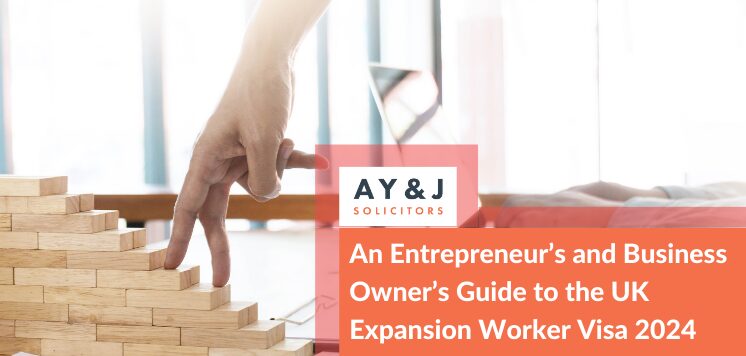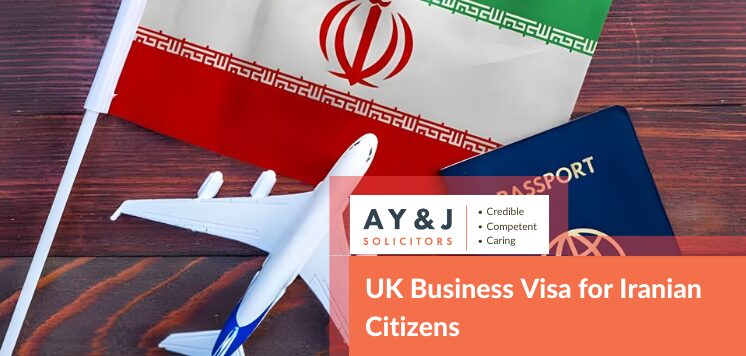Disclaimer: The information in this blog is accurate as of its publication date. Any updates after that date are not reflected here.
The UK remains a highly desirable destination for entrepreneurs from around the world, with its thriving economy, world-class educational institutions, and truly dynamic business environment. If you are an overseas business owner looking to expand into the UK, this guide is for you. Here, we will explain how international business owners can leverage the benefits of the UK Expansion Worker Visa in 2025 to expand into the UK market. We will explain:
- All you need to know about the UK’s Expansion Worker visa as an entrepreneur and business owner
- The recent changes in UK immigration laws that may affect you
- How to deal with the UK’s tough stance on immigration as an entrepreneur and business owner and
- What you should know as an entrepreneur and business owner to deal with the immigration rule changes
Table of Contents
What is the UK Expansion Worker Visa?
The UK Expansion Worker visa, part of the broader Global Business Mobility (GBM) scheme, makes it easy for already established overseas businesses to send key personnel to the UK to set up and manage new branches or subsidiaries here.
Do I qualify for a GBM UK Expansion Worker visa?
To qualify for the UK Expansion Worker Visa, you must:
- Have a certificate of sponsorship
- Have worked for your employer outside the UK for at least 12 months. The only exceptions to this are if you:
- Have a salary of over £73,900
- Are a Japanese national working for a Japanese company that is expanding to the UK, or
- Are a national or permanent resident of Australia doing work for an Australian company that is expanding to the UK
- Have a job that is on the list of eligible occupations
- Have a salary of £48,500 per year or the ‘going rate’ for your job – whichever is higher.
How to apply for a GBM UK Expansion Worker visa?
The application process for the UK Expansion Worker Visa involves several stages, as follows:
- Secure a Certificate of Sponsorship from your employer – if they do not have a sponsor licence yet, they will need to get one before you can apply for a visa.
- Gather all of the necessary documents, including proof of identity, sponsorship, and plans to expand into the UK.
- Prepare and submit your GBM Expansion Worker application form online, and
- Pay the required application fee.
- Have identity checked – this can be done by attending a visa application centre or by using the mobile phone ‘UK Immigration: ID Check’ app to scan your identity document and
- Await a decision – applications made outside the UK typically take up to 3 weeks.
UK Immigration Changes on 4th April 2024 – The Latest Details
On 4th April 2024, a number of important immigration law changes came into effect, including changes to:
- Skilled Worker Visa minimum salary requirements
- Occupation codes
- Expansion of supplementary employment permissions
- New immigration salary list
Skilled worker minimum salary increase
One of the key changes in the UK Visa Changes 2024 is the increase in the minimum salary threshold for Skilled Worker Visas. The minimum salary required for Skilled Worker visa applicants has risen from £26,200 to £38,700, or £38,700 per year, or the ‘going rate’ for the type of work being undertaken.
New entrant discounts remain in place
Thankfully, despite the sharp increase in the minimum salary threshold, the new entrant discounts for young workers, new job entrants, recent graduates, and those with PhDs remain in place. These discounts are crucial for businesses looking to hire fresh talent and provide opportunities for growth and development within the UK. The new entrant discounts allow Skilled Worker visa applicants to meet the eligibility requirements with a salary of 70% and 90% of the standard going rate for their job, as long as they are paid at least £30,960 per year.
New immigration salary list
The Home Office now has a new list of occupations that qualify for a reduced salary threshold called the ‘immigration salary list’. For roles on the list, the minimum salary is 80% of the route’s usual minimum rate to qualify for a Skilled Worker or Health and Care Worker visa.
Changes to the Standard Occupation Codes (SOC)
Under the latest immigration changes, the Home Office changed the standard occupation codes (SOC) from SOC 2010 to SOC 2020, aligning them more closely with the current labour market. This change affects the eligibility of certain roles for skilled worker visas and may require businesses to adjust their recruitment strategies. A full list of the eligible occupation codes that qualify for a Skilled Worker visa can be found on the Home Office website.
Significant expansion of supplementary employment permission
Another significant change is the welcome relaxation of supplementary employment permissions. Skilled Worker visa holders can take on additional work, as long as it is in an occupation on the new Immigration Salary List OR it is in the same occupation and at the same level as their main job. Those undertaking supplementary work must continue to perform their normal sponsored role and ensure that the additional work accounts for no more than 20 hours of a working week. This flexibility is extremely beneficial for both employers and employees, offering greater opportunities for career development.
Changes to the Global Business Mobility visa – Senior or Specialist Worker
The Global Business Mobility Senior or Specialist Worker visa enables overseas businesses to send staff from outside the UK to a UK office on a temporary transfer or secondment basis.
Under the latest immigration rule changes, the following changes have been made to the Global Business Mobility (GBM) Senior or Specialist Worker (SSW) routes from 4th April 2024:
- The minimum salary threshold increased from £45,800 to £48,500, or the ‘going rate’ salary for the type of job (if this is higher), and
- the minimum ‘going rate’ for each role type increased
Dealing with the UK’s tougher immigration climate
There is little doubt that the UK continues to adopt a much tougher stance on immigration these days. Much has been said in the media and by politicians about reducing the level of legal migration to the UK. In real terms, this means imposing stricter rules and more rigorous enforcement of those rules. One such example is the substantial rise in the minimum income threshold for the Skilled Worker visa. Another is the strict right-to-work checks that all employers in the UK are required to carry out to prevent illegal working.
If you represent an international business in the UK, a UK business, or you run your own business in the UK, it is crucial to stay informed about any changes before they happen. This will enable you to make the necessary adjustments to how to operate in the UK and/or sponsor overseas workers. In turn, this will help you to avoid penalties and disruption to your business. An immigration Solicitor in the UK will keep you up to date with upcoming policy changes and advise you on how best to navigate in a way that meets your business needs.
What else is in store for 2024?
One of the big changes to the UK for 2024 is the change of government in July. At the time of writing, it is expected that the UK will elect a Labour government, but they will be under pressure from parties who have adopted a hard line on immigration, such as the Conservatives and the Reform parties. For this reason, we don’t expect the new government to soften its approach to immigration a great deal, if at all. Labour’s policy on immigration states that they will:
- ‘Fire up’ skills training rather than look overseas to fill skills gaps and end the days of sectors languishing on the shortage of skills list without a plan to deal with the problem.
- Reform the points-based immigration system, bringing down migration and
- Bring in new powers to ban hiring from overseas for employers and recruitment agencies who break employment law to end workplace exploitation.
We will keep you abreast of any upcoming immigration policy changes over the coming weeks and months.
What Should Employers Do Now?
If you represent an international business with a presence in the UK, in light of the most recent changes to the Skilled Worker visa and GBM Expansion Worker visa, we recommend taking the following proactive steps to ensure the compliance of your business:
- Check that your business is complying with the latest rules and regulations – including if the roles you sponsor overseas workers for are still on the list of eligible occupations.
- Carry out a mock audit to ensure that your business will pass a sponsor licence compliance visit – an immigration Solicitor can do this for you.
- Provide training for HR and legal teams on the latest changes and compliance requirements.
- Work with immigration experts to develop strategies for hiring and retaining international talent and
- Regularly check for updates on UK immigration law to stay ahead of any further changes.
Final words
Navigating the UK immigration landscape can be complex, especially when rules are constantly changing. The UK Expansion Worker Visa 2025 offers excellent opportunities for growth, and by understanding the new regulations and preparing thoroughly, entrepreneurs and business owners can maximise their chances of commercial success here. The key is partnering with trusted UK immigration specialists who can give you a fore-warning of any changes that may affect you and explain how to deal with them effectively. They will also explain any alternative immigration routes that you may not have considered, such as self-sponsorship.
A Y & J Solicitors is a specialist immigration law firm with extensive experience with all types of visa applications. We have an in-depth understanding of immigration law and are professional and results-focused. For assistance with your visa application or any other UK immigration law concerns, please contact us on +44 20 7404 7933 or using our contact us page. We’re here to help!










